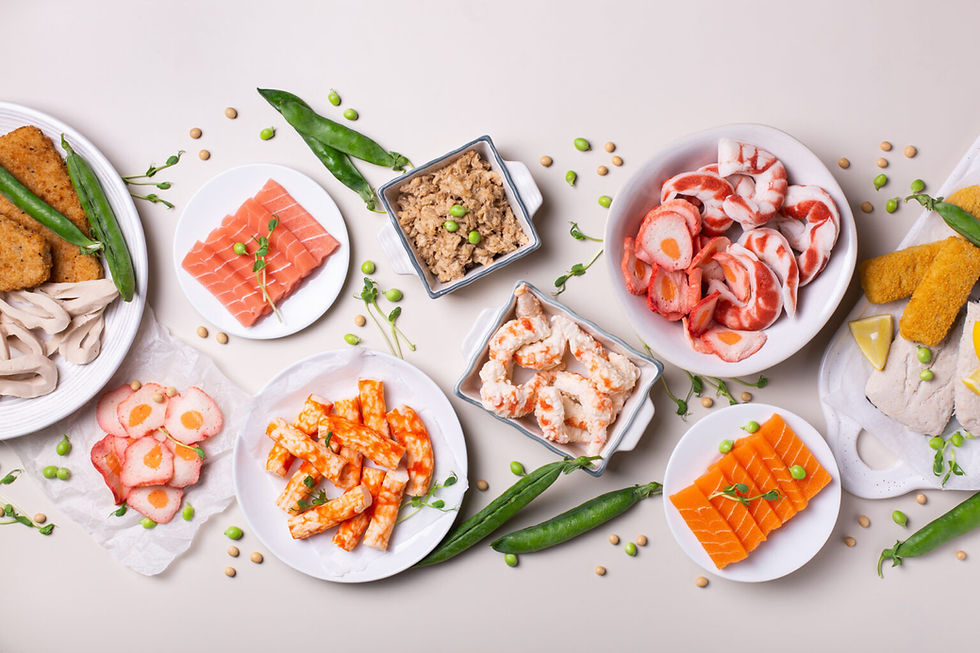ProVeg International has published a report highlighting how smart formulation of plant-based seafood alternatives can meet consumers’ nutritional needs while reducing pressure on marine ecosystems.
Named ‘Out of the Net, Into the Future,’ the report analyses the nutritional profiles of 100 alternative fish products sold across 11 countries worldwide.
ProVeg emphasised that research shows 40% of global fish stocks are currently overfished, with another 50% ‘harvested to their limit’ by trawlers raking the oceans to meet global seafood demand.
A 2023 survey indicated a strong market base for plant-based seafood, with 43% of European consumers saying they find it appealing and 43% saying they would consider purchasing it.
A variety of plant-based alternatives are now widely available in retail globally, ranging from formats such as fish sticks, burgers and fillets to smoked salmon, tuna, shrimp and calamari.
Key findings
ProVeg looked at each product’s nutritional profile, paying attention to key nutrients that motivate consumers to choose fish – such as protein, omega-3 fatty acids, iron, iodine and vitamin B12.
Researchers also analysed the levels of saturated fat and salt – nutrients that should be limited to reduce negative health impacts – as well as gut-friendly fibre, which is found naturally only in plant-based foods and supports digestion.
Valentina Gallani, health and nutrition manager at ProVeg, noted that most currently available alternatives are low in saturated fat and provide a good source of protein in addition to providing the added benefit of fibre, which is not found in traditional fish.
“However, we would like to see more inclusion of omega-3, such as algae oil, and more consistent fortification of essential micronutrients such as vitamin B12, iron and iodine,” she said.
The report highlighted that 78% of products analysed qualified as a source of protein, while all fish alternatives contain fibre, with an average of 3.57g per 100g.
However, only 27% of products listed omega-3 content, and those that did primarily contained ALA – but not the more bioavailable EPA and DHA found in fish. Algae-based omega-3 ingredients could help to bridge this gap.
Some products lacked any fortification with essential micronutrients, and most products included additives such as stabilisers and thickeners, which are not well understood by consumers. ProVeg noted that cleaner labels and ingredient transparency can help to boost consumer confidence in these products.
Next steps
The report makes recommendations to producers, retailers and authorities on how to boost the existing market and develop alternatives that are equally nutritious to their conventional seafood counterparts.
Producers should focus on effectively substituting the nutritional value of animal-based fish products, while retailers are encouraged to place plant-based seafood in high-traffic areas or close to the animal variants, while ensuring they are priced competitively with traditional seafood products.
Governments are called on to set clear nutritional guidelines for plant-based fish alternatives to improve product quality, support consumers’ choices and provide guidance to producers.
Additionally, consumer organisations can promote food literacy around food labels and understanding plant-based foods’ benefits and limitations, while scientists and researchers can support by investigating long-term health impacts, nutrient bioavailability and sensory qualities of seafood alternatives. This can help to strengthen the evidence base as a foundation for driving innovation in the category, ProVeg said.
Aquaculture ‘not a silver bullet’
The report also highlights concerns associated with fish farming, noting that fish farms are linked to the destruction of critical coastal ecosystems such as mangroves, seagrass beds and coral reefs. Research found that aquaculture was responsible for nearly 27% of global mangrove loss between 2000 and 2020.
Waste from fish farms, including uneaten feed and fish feces, can result in water pollution and harmful algal blooms. Furthermore, the use of antibiotics and chemicals in these systems raises concerns for environmental health and the rise of antimicrobial-resistant bacteria.
Gallani said: “Aquaculture has only introduced more and different problems for us to tackle. We would urge societies to focus rather on building up the quality and accessibility of plant-based fish so that individuals can increasingly help to restore the oceans and enjoy healthy food at the same time.”

_gif.gif)



